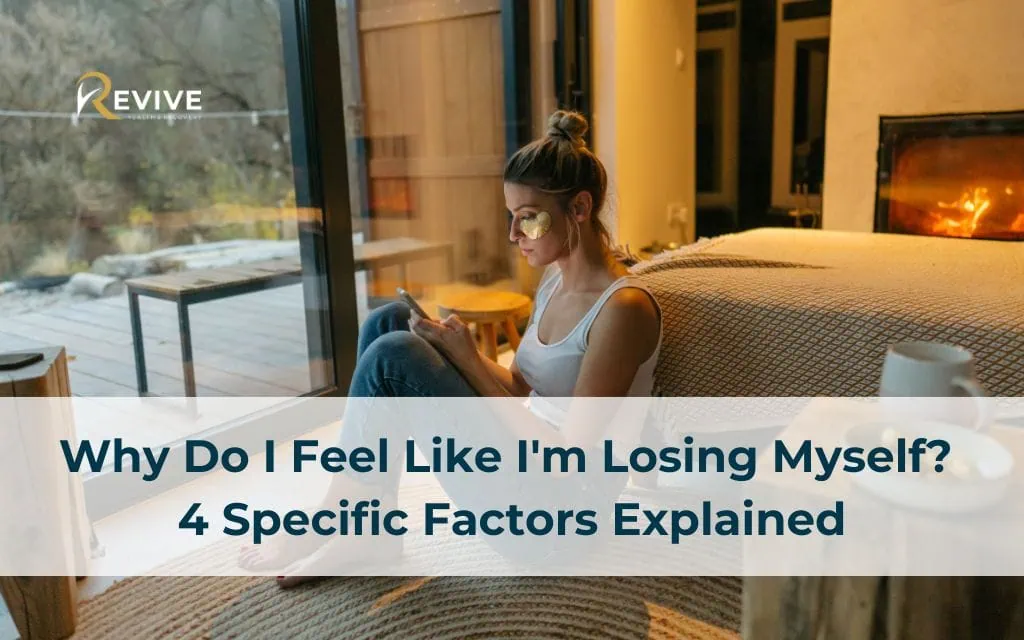Have you been asking yourself, “Why do I feel like I’m losing myself?” You’re not alone, this echoes in the minds of countless individuals. This profound question – “why do I feel like I’m losing myself” – reflects a legitimate psychological struggle that affects many Denver residents. The feeling behind “why do I feel like I’m losing myself” is more than just a passing emotion – it often accompanies depression, trauma, or major life transitions.
In Denver, where the altitude isn’t the only thing that can leave you breathless, many residents find themselves gasping for a sense of self amidst career pressures, relationship changes, and the unique challenges of living in a rapidly growing metropolitan area. Understanding why you feel lost is the first crucial step toward finding yourself again and rebuilding a stronger sense of identity.
What’s Happening When You Ask “Why Do I Feel Like I’m Losing Myself?”
When you experience this disconnection and think, “why do I feel like I’m losing myself,” what’s happening psychologically is a misalignment between different aspects of your identity. According to Dr.Edward Higgins’ self-discrepancy theory, he explains that our identity comprises three components: who you think you are (actual self), who you wish to be (ideal self), and who you believe you should be (ought self). When these components fall out of alignment, the question “why do I feel like I’m losing myself” naturally arises as you begin questioning your purpose, values, and personality traits.
This disconnection manifests as questioning your purpose, values, and even personality traits that once seemed fundamental to who you are. For Denver residents specifically, the city’s unique combination of urban opportunities and natural escapes can sometimes amplify this internal conflict as you navigate between career ambitions and personal fulfillment.
Colorado-Specific Factors That Contribute to Identity Loss
- Altitude Effects: Denver’s mile-high elevation isn’t just a geographical feature – research has linked higher altitudes to increased rates of depression, which can lead to that feeling of “why do I feel like I’m losing myself.” This biological component adds complexity to mental health treatment in our region.
- Rapid Community Changes: Denver’s transformation from a mid-sized city to a booming metropolis has changed neighborhood dynamics, leaving many residents wondering, “why do I feel like I’m losing myself” as they feel disconnected from their familiar environments.
- Achievement Culture: Colorado’s outdoor-oriented, achievement-focused lifestyle creates pressure to constantly perform – whether climbing mountains or climbing corporate ladders – leaving little time for authentic self-connection.
- Seasonal Influences: Our distinct seasonal changes, particularly long winters with reduced sunlight, contribute to mood fluctuations that can intensify feelings of “why do I feel like I’m losing myself.”

Recognizing the Signs When You Feel Like You’re Losing Yourself
Emotional and Psychological Indicators
If you’re asking “why do I feel like I’m losing myself” and experiencing several of these symptoms, you may be dealing with identity loss:
- Persistent questioning about who you are at a fundamental level
- Difficulty making decisions that once came naturally
- Feeling anxious or dissatisfied despite external achievements
- Changing yourself to fit different environments or relationships
- Trouble identifying your preferences, values, or goals
For many Denver residents wondering “why do I feel like I’m losing myself,” these symptoms manifest alongside depression. Recent studies show approximately 15% of Denver adults report eight or more days of severe emotional problems in a month – significantly higher than national averages.
The Physical Manifestations You Might Not Recognize
Your body often signals identity disconnection before your mind fully registers the feeling of “why do I feel like I’m losing myself”:
- Sleep disturbances (insomnia or oversleeping)
- Changes in energy levels (unusual fatigue or restlessness)
- Altered eating patterns
- Physical tension (headaches, muscle stiffness)
Denver’s high altitude can intensify these physical symptoms, creating a complex interplay between physiological and psychological factors when you’re experiencing “why do I feel like I’m losing myself.”
The Critical Connection Between Depression and Identity Loss
How Depression Intensifies the Feeling of “Why Do I Feel Like I’m Losing Myself”
Depression does more than simply make you feel sad – it fundamentally alters how you perceive yourself. As described in Psychology Today, “Depression is the ultimate identity thief.” When depressed, your capacity to experience pleasure (anhedonia), maintain energy, and concentrate diminishes, making it nearly impossible to engage with activities and relationships that once defined you.
Depression creates a vicious cycle where feelings of worthlessness and hopelessness reinforce negative self-perception, further eroding your sense of identity. For Colorado residents, where depression rates exceed the national average in many communities, this identity theft through depression represents a significant mental health concern.
Unique Challenges in Denver’s Mental Health Landscape
Denver’s mental health statistics reveal concerning trends:
- The city consistently reports higher suicide rates than national averages
- Colorado ranks among states with the highest prevalence of depression
- Mental health treatment access remains challenging despite growing awareness
As the Colorado Health Institute reports, more than one in four Colorado residents reported poor mental health in 2023 – the highest number ever measured. These statistics underscore how prevalent identity struggles and depression are within Denver’s population.

Finding Yourself Again: Practical Strategies for Denver Residents
Self-Exploration Techniques When You Feel Like You’re Losing Yourself
Reclaiming your sense of self when you’re asking “why do I feel like I’m losing myself” begins with intentional exploration:
- Journaling and reflection: Document your thoughts and experiences to identify patterns that represent your authentic self
- Values clarification: Identify core principles that guide your decisions
- Mindfulness practices: Present-moment awareness helps quiet external voices and connect with your internal compass
- Experimentation with new activities: Try varied experiences to discover what resonates with your true self
For Denver residents wondering “why do I feel like I’m losing myself,” utilizing the city’s diverse cultural offerings and natural surroundings provides rich opportunities for this exploration.
Leveraging Colorado’s Natural Environment for Healing
Denver’s extraordinary natural landscape offers unique healing opportunities when you’re feeling “why do I feel like I’m losing myself”:
- Nature immersion: Research consistently shows that time spent in natural settings reduces symptoms of depression while promoting self-awareness. Denver’s proximity to mountain trails, parks, and open spaces provides accessible nature therapy.
- Altitude-aware activities: Understanding how Denver’s elevation affects your physical and mental state allows you to develop appropriate self-care strategies.
- Outdoor physical activity: Exercise programs addressing mental health have gained traction in Denver, with initiatives showing remarkable success in combating depression and identity loss.
Building Community Connections in Colorado
Strengthening your sense of belonging supports identity formation:
- Local interest groups: Denver’s diverse communities offer opportunities to connect with like-minded individuals
- Volunteer opportunities: Contributing to causes you value reinforces key aspects of identity
- Cultural engagement: Participating in Denver’s rich cultural scene opens new avenues for self-discovery
Professional Support: When Self-Help Isn’t Enough
While self-exploration techniques are valuable, professional support is often necessary when you’re deeply feeling “why do I feel like I’m losing myself,” especially when depression is involved. Mental health services in Denver have evolved to address the specific needs of our community.

Denver offers specialized resources for identity recovery:
- Identity-focused therapy: Several Denver practitioners specialize in identity exploration therapy, particularly helpful for those experiencing major life transitions
- Group support programs: Peer support groups throughout Colorado provide community-based identity reinforcement
- Holistic approaches: Denver’s wellness community offers complementary approaches like mindfulness training, yoga, and exercise programs known to strengthen identity
FAQs About Why Do I Feel Like Im Losing Myself
Can depression make you lose your sense of self?
Yes, depression fundamentally alters your self-perception and identity, often triggering that feeling of “why do I feel like I’m losing myself.” It diminishes your ability to feel pleasure and concentrate – essential elements for engaging with activities that define you. Depression also creates persistent negative thought patterns that erode self-confidence. At Revive Health Recovery, we treat both depression and identity loss simultaneously for optimal recovery.
How do I know if I’m experiencing an identity crisis or just going through a tough time?
An identity crisis involves persistent questioning of “why do I feel like I’m losing myself” – questioning your values, purpose, and core traits. While temporary stress can cause similar feelings, an identity crisis typically lasts longer and penetrates deeper into your self-concept. Our assessment process at Revive Health Recovery can help determine whether you’re experiencing an identity crisis and create a personalized treatment plan.
Is losing your sense of self common among Colorado residents?
Yes, Colorado residents face unique factors that contribute to the feeling of “why do I feel like I’m losing myself,” including the state’s high elevation (linked to increased depression rates), rapid population growth changing community dynamics, achievement-focused culture, and seasonal variations affecting mental health. Denver specifically shows higher-than-average rates of depression and related mental health challenges that can impact identity.
What therapies are most effective for recovering your sense of self?
Evidence-based approaches for addressing “why do I feel like I’m losing myself” include Mindfulness-Based Cognitive Therapy (MBCT), narrative therapy, and acceptance and commitment therapy (ACT). At Revive Health Recovery, we utilize these and other proven methods tailored to your specific situation and needs.
How long does it typically take to rebuild your sense of identity after losing it?
Recovery timelines for those asking “why do I feel like I’m losing myself” vary significantly based on individual circumstances, underlying causes, and available support systems. Some people experience meaningful improvement within months, while others find identity rebuilding is an ongoing journey. Professional support typically accelerates this process. At Revive Health Recovery, we develop personalized treatment plans that respect your unique recovery timeline.
Why Revive Health Recovery Offers Specialized Support for Identity Recovery
At Revive Health Recovery, we’ve developed comprehensive treatment approaches specifically designed for Denver residents struggling with the question “why do I feel like I’m losing myself”:
- Colorado-specific understanding: Our therapists understand the unique challenges of living in Denver and how they impact mental health
- Integrated treatment approaches: We address both depression and identity issues simultaneously
- Evidence-based therapy: Our approaches include cognitive-behavioral therapy, acceptance and commitment therapy, and mindfulness-based interventions
- Flexible outpatient programs: Treatment that works with your schedule while providing the support you need
Our team regularly witnesses transformative recoveries as clients reconnect with their authentic selves and build lives aligned with their core values.
Take the First Step Toward Reconnecting With Yourself
Feeling “why do I feel like I’m losing myself” isn’t just a personal struggle – it’s a recognized psychological challenge that affects many Denver residents. At Revive Health Recovery, we understand that reclaiming your sense of self requires personalized, evidence-based support that addresses both the symptoms and root causes of identity loss.
Our team specializes in guiding individuals through the process of self-discovery and identity reconstruction. Located in Denver at 1427 S Federal Blvd, we offer accessible, compassionate care designed specifically for Colorado residents navigating identity challenges.
Don’t continue walking through life feeling disconnected from who you truly are. Contact Revive Health Recovery today at (303) 268-4655 or email us at contact@revivehealthrecovery.com to begin your journey back to yourself. Our services are available 24/7, reflecting our commitment to being there whenever you need support on your path to rediscovering your authentic identity.



